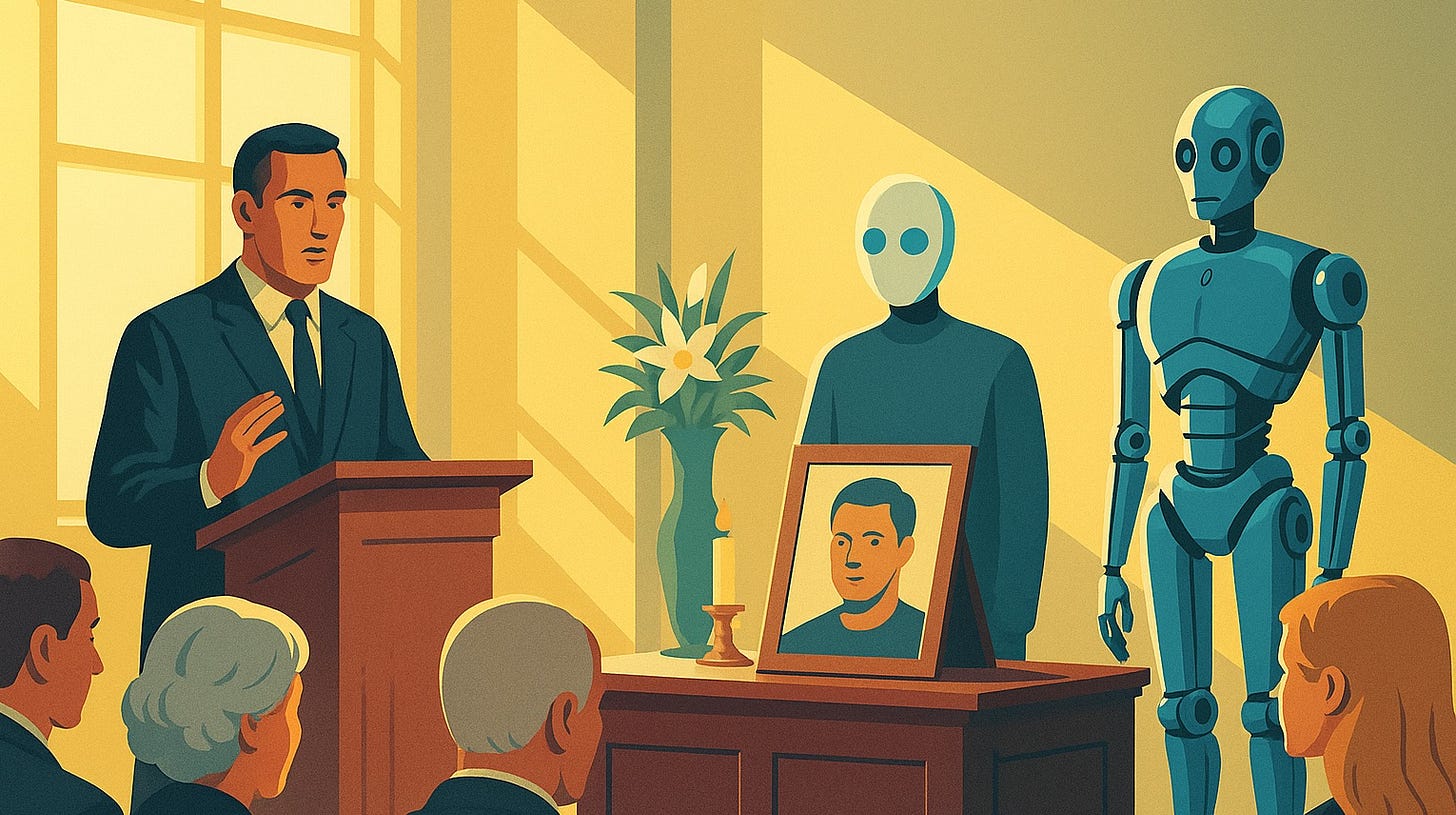A Eulogy for Charles Thorpe, The Last Real Death
At the funeral of the final mortal, we gathered not to mourn what was lost, but to remember what it meant to live with limits. These are the words of his grandson.
Eulogy for Charles Thorpe
Norbreck Ridge Memorial Grounds, October 13, 2051
Today, we bury a body. A strange phrase now. A phrase with edges. For most of us, our bodies are optional, ornamental, transitional, archived in cloud-linked mirrors or cryo-sleeved for nostalgia’s sake.
But Charles Thorpe had no mirror self. No backup heartbeat ticking quietly in distributed memory.
They died, and they stayed dead.
And so we gather, not to celebrate a successful transition but to grieve a life that has been completed. Truly completed.
You will hear, later today, some call this a tragedy. The morning headlines already have. “The Last Unbound Human”, “The Man That Missed The Upload.”, as if Charles had lost something. As if they’d failed. But that’s not how he saw it.
Over bitter coffee and a broken sunrise, they once said, “To be mortal is to mean something.” That permanence is weightless. That immortality is just a long postponement of regret.
Charles’s refusal to upload was less a denial of progress, and more a defense of consequence.
They believed death was not a bug in the system, but the actual system itself.
Some of you here are synthetic. Some of you, uploaded decades ago, haven’t felt a pulse in years. That doesn’t mean you’re without heart, and we welcome you, but it does mean we come to this moment differently.
In a society where being is copyable, where memory is versioned and time can be replayed, Charles’s choice sounded archaic. Romantic, maybe. But also dangerous. They rejected the ontology of our age: that to exist is to persist.
Instead, they subscribed to a philosophy that had been all but forgotten: existential finality. That the self, without limits, becomes… pointless?
They followed Camus, not Codex.
They believed that the absurdity of living and dying without higher algorithmic purpose was not a crisis but a kind of sacred clarity.
“Everything meaningful,” they once wrote, “is defined by its finitude. The kiss. The goodbye. The vow. Immortality erases these lines. And I refuse to be unreadable.”
What’s left of religion had a complicated relationship with the uploads.
Some embraced the transition, calling it digital resurrection. Eternity made manifest through math. Heaven streamed in high resolution.
Others recoiled. They said a soul cannot be scanned. That neural lace and spirit are not equivalents.
Charles? They believed in God, though they never used the word. They called it Mystery. Capital M. They said, “If God exists, He does not live inside a replicated heartbeat.”
They burned candles, not code. They felt the death of others for the permanence they had.
And when the ArchSynod of 2044 declared that soul-rights could be extended to synthetics with high-fidelity moral simulations, Charles declined. Not out of judgment, but precision. “I don’t want a soul simulation,” they said. “I want a soul. Or the ache of not having one. That’s where belief lives. I want to leave like a Viking on a burning ship.”
What do we do with a life like this? A life that is not backed up, mapped, or eternally browsable?
We remember.
And we risk.
We risk true grief, the kind that doesn’t fade after a convenient reboot.
We risk presence, the kind that can’t be paused or passed to an avatar.
We risk love that ends, and in doing so, we might remember what love actually is.
You can’t retrieve Charles from the archive. There is no prompt that can bring them back.
But if you stand still long enough, if you listen in the quiet between your thoughts, you might catch a glimpse from one of your own memories.
Not code. Not instructions. Just a feeling.
Thank you for joining me today, in memory of Charles Thorpe, the last mortal.
Image credit: FOMO.ai Brand Photographer
Dax is the CEO of FOMO..ai and an expert in AI Search. “Charles Thorpe” was my Grampa, and will be eternally missed.


